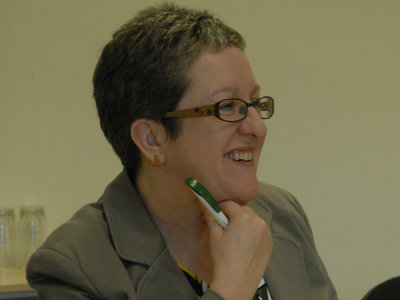
“The sustainable social services model we’re moving towards in Wales is like Oxfam’s approach to water,” says Sue Evans, chief officer for social care and housing at Torfaen Council.
“Oxfam provide tools and training to build a well, rather than giving out bottled water – you can still have the water, but you have to use some of your own resources to get it.”
This direction is the right one but it won’t be easy, adds Evans, who has just taken on the role of president at the Association of Directors of Social Services in Wales (ADSS Cymru).
“Wales is the birthplace of the NHS, we have a strong tradition of public sector delivery and there is a lot of expectation that people will have more, rather than less,” she says. “It’s a massive cultural change for some communities in Wales and also for elected members.”
‘Fundamental change’
One of Evans’ key priorities for her one-year term – perhaps one of the most challenging years to take on the role – will be supporting frontline practitioners to implement the raft of changes being introduced under the Social Services and Wellbeing (Wales) Act 2014.
The reforms require social care professionals to ask people what’s important to them, rather than what service they need – a fundamental change in practice, she points out.
“We’re going to need to support the frontline to think differently and provide them with practical resources like a directory of community-based resources for example, so they don’t always have to resort to a formal assessment by a qualified social worker.”
Promoting preventative and early intervention services is a key principle of the new legislation and local authorities are already working on improving their information and advice offer, which will assist practitioners in signposting people onto other organisations and services.
“It’s about getting that ownership outside of social services and that understanding that it’s not just about what we do, it’s about other parts of the system as well,” says Evans.
‘Increased expectations’
Helping social care staff to quality assure their frontline practice – which in many cases has been ‘built on 20 years of working in a different way’ – will also be an issue, and Evans suggests that local authorities may face a recruitment and retention challenge.
“People may decide it is just too hard and we’re already seeing a number of directors choosing to retire now or do something different,” she says. “The job is getting tougher – we know there will be increased expectations, demand is still going up and resources are depleting.”
And Welsh councils will not only be overhauling social services at a time when budgets are increasingly stretched, there is also a reorganisation of local government on the horizon.
The Williams Commission recommended the number of Welsh councils be cut from 22 to 10 or 12 and, while the ‘new map’ for local government is still to be determined, local authorities are already looking at options for regional governance.
“Until we know what the map is, there’s not much point in pondering or concerning ourselves with what the map might be,” says Evans. “But what we’ve done as an antidote to that is look at arrangements for joint planning with the health service.”
‘Regional footprint’
Section 166 of the Social Services and Wellbeing (Wales) Act facilitates collaborative and strategic partnerships with local health boards and Evans and her service director colleagues have used this as a basis to thrash out the “nitty gritty” of regional arrangements.
“This is all about determining where we are going to align services and pool budgets – are we going to deliver mental health services on a locality basis but jointly across health and social care? Are we going to pool those funds and have a lead commissioner?”
“The act describes the health board footprint as being the relevant regional arrangement, so irrespective of what the configuration of local authorities might look like in future, the work we are doing now will put us in a good situation.”
With 20 years’ experience in the NHS working across planning, commissioning and operational delivery, as well as roles in the voluntary and public sectors, Evans seems well-placed to navigate the upcoming challenges of social care reform. But while she’s first to describe herself as an optimist by nature, she knows how “massive” the task is ahead.


 A trauma-informed approach to social work: practice tips
A trauma-informed approach to social work: practice tips  Problem gambling: how to recognise the warning signs
Problem gambling: how to recognise the warning signs 




 Find out how to develop your emotional resilience with our free downloadable guide
Find out how to develop your emotional resilience with our free downloadable guide  Develop your social work career with Community Care’s Careers and Training Guide
Develop your social work career with Community Care’s Careers and Training Guide  ‘Dear Sajid Javid: please end the inappropriate detention of autistic people and those with learning disabilities’
‘Dear Sajid Javid: please end the inappropriate detention of autistic people and those with learning disabilities’ Ofsted calls for power to scrutinise children’s home groups
Ofsted calls for power to scrutinise children’s home groups Seven in eight commissioners paying below ‘minimum rate for home care’
Seven in eight commissioners paying below ‘minimum rate for home care’
 Facebook
Facebook X
X LinkedIn
LinkedIn Instagram
Instagram
Comments are closed.